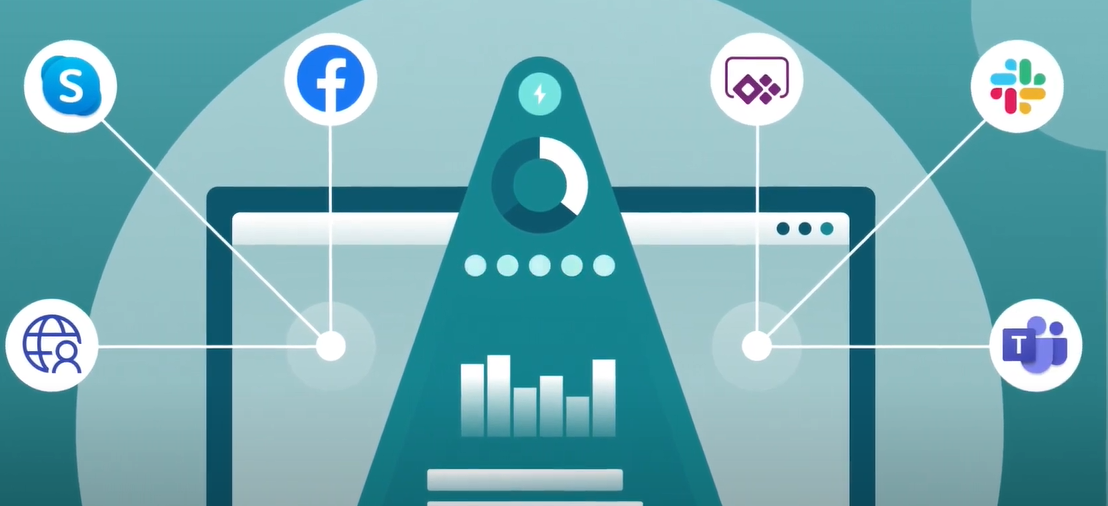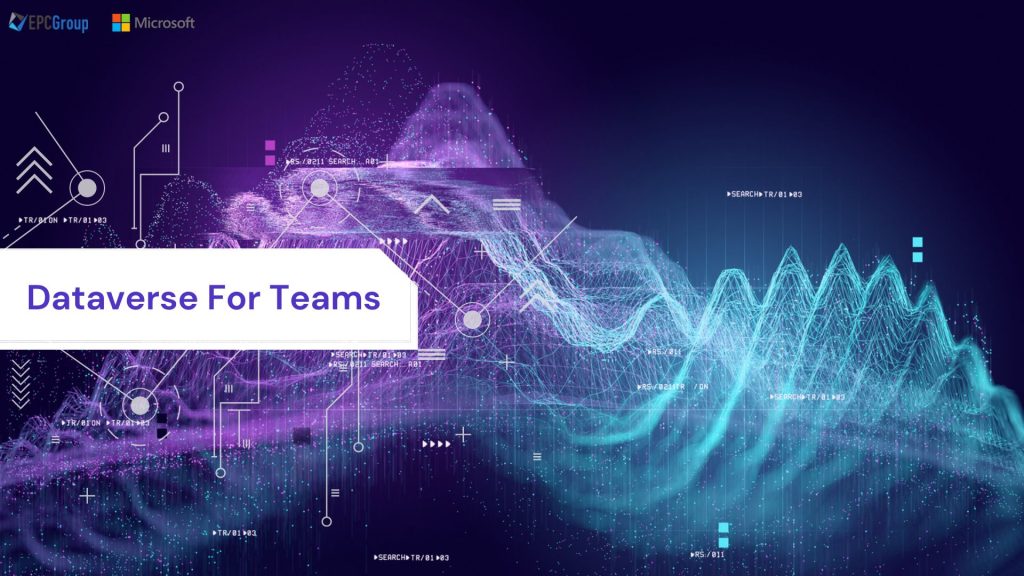Dataverse for Teams refers to an integrated version of Dataverse and the Microsoft Teams environment. This integration creates a low-code data platform for the users of Teams. Companies can perform a range of functions in this integrated environment using some parts of the Power Platform.
Dataverse for Teams Features, Uses and Security
Reasons for using integrating Dataverse with Teams:
The concept of integrating Dataverse with Teams is increasingly becoming popular. The seamless integration of Dataverse with Teams makes the former more efficient. Some of the major reasons for the popularity of this integration include the fact that Dataverse creates a single environment for all the Microsoft Teams where the user companies can create data, applications, chatbots, workflows and dashboards.
In addition to this, the Dataverse environment supports backups, point in time restore disaster recovery methods. Along with these benefits, this environment also provides the users with a relational data storage space, access to rich data types and enterprise grade governance for teams. Thus, working with this integrated solution provides several advantages to business organizations.
Building dashboards, chatbots and workflows: A Dataverse for Teams perspective
The Dataverse environment lets you built-in, low-code data platform that allows the Microsoft Team’s users to build custom apps, chatbots, and flows in Teams by using Power Apps, Power Virtual Agents, and Power Automate of the Power Platform. It is built atop Microsoft Dataverse which provides relational data storage, rich data types, and enterprise-grade governance. In addition to this, it also has a one-click solution deployment to the Microsoft Teams app. The user companies can also provision Dataverse and create common tables for the organizational data.
The Dataverse for Teams solutions can be categorised into the following categories which are:
- Apps – The user organizations have the opportunity to use Power Apps in Teams to create custom applications that are designed to use the enhanced performance and scalability of Dataverse. It also helps in building low-code apps to meet your collaboration needs.
- Workflows – Automating repetitive tasks with Power Automate in Teams is now simpler. Companies can create flows that can respond to new messages in Teams when the data in Dataverse changes. These flows can be designed also when a Teams message is selected and that message has begun a process. This increases the productivity of the user organization.
- Chatbots – This feature helps in responding to the employee needs through the creation of bots with the help of Power Virtual Agents within Teams. In addition to fulfilling needs, the employees can also share their expertise through FAQs and continue collaboration through interaction with the organizational data.
- Dashboards – Dashboards are designed with the focus of presenting powerful interactive charts and data using Power BI in Teams. The users can also explore and interact with the company data in Dataverse for Teams.

The use of Power Virtual Agents within Teams using Dataverse for Teams:
Employees can work efficiently and make better decisions when they have quick access to insights that are actionable and derived in real-time. This also aids the process of reducing organizational errors and leads to effective cost management. Power Virtual Agents can help user organizations in using the Team environment with increased productivity by creating chatbots with Dataverse.
Chatbots are designed to create a personalized experience that simplifies how employees receive information. The Power Virtual Agents and Dataverse for Teams create intelligent chatbots with rich data types for quick response to employee needs using low-code solutions. Power Virtual Agents allow the user to create and edit chatbots, test to see if the chatbot works efficiently, publish the chatbots to the Teams of the user company and review the performance of the bots over time.
Automating repetitive processes in Microsoft Teams:
The employees in an organizational framework are usually overworked because some of the regular or everyday business functions have to be done repeatedly. This exhaustion can be avoided by automating these everyday workflows which can help in proper time management. The process of automating repetitive processes in Microsoft Teams can be completed through the use of Power Automate which is a part of the Power Platform.
The Power Automate app for Teams allows the user company to build a flow that automates the processes using a simple creation experience. The selection of simple parameters from a few drop-down menus can simplify the process automation for the user company and its employees.
These automated flows can be created based on 50 templates. Along with creating flows with Power Automate, these can also be managed in a simplified manner by adding the Teams to the home screen. This makes it easier to turn the flows off and on and keep a track of people sharing the flows and the types of flows being shared. Finally, the Teams and channels in which these flows function can also be monitored.

Broad Distribution Apps Functionality: Meaning
The applications built on Dataverse for Teams were previously designed to be played by other members of the specific team. This was adequate for the small Apps that were focused on specific users but made it complex to develop centralized apps for large organizations.
To tackle this shortcoming, Microsoft introduced the broad distribution apps functionality. The feature could be used to take an application that was built in a Team within Teams and share the same with other employees in the organizational framework of the user company.
Apart from simplifying the deployment of apps built-in Teams, this feature made the centralized deployment Team capable of building an app on top of Dataverse for Teams. Additionally, the new apps can then be shared with a group of users who do not belong to the development team.
Data loss prevention policy: A Dataverse perspective
The Dataverse environment for Teams is automatically generated for the specific team selected by the user company when a new Teams application or Bot is created. The environment is utilized for storing, managing and sharing team-specific data, applications or workflows.
Each of the Teams is permitted to have a single environment and the bots, applications and flows created within the Power Apps inside the Team are available from the specific Team’s database. The user organizations can identify a environment in the Power Platform Admin Center through the use of the Type column in the list of environments.
Microsoft currently provides a solution for the users, known as the Data Loss Prevention policy. This solution can be applied to all the Team’s environments within a tenant, which allows the user company to better control the organizational data. In addition to this, the data loss prevention policy also aids the users in avoiding any hindrance in their ability to create no-code or low-code solutions.
Security features in Dataverse for Teams:
Collaboration in the Teams environment occurs with people from both inside and outside the user organization. This implies that the security model that can support such collaboration needs to be simpler. In Dataverse for Teams, the access to data is pre-configured with a certain security role which is based on membership types. These are categorised into owners, members or guests. This implies that access to the Database for Teams environment is provided according to the role assignment method where the users are assigned specific roles.
As Dataverse is not specific to the Teams environment, it provides more options for the admin and user roles. In addition to this, the Dataverse integration also provides several additional security capabilities which include the customer-managed keys. The field-level security, hierarchical security, sharing and support for legacy authentication are some of the other security features. The Dataverse is equipped with compliance capabilities and can perform advanced encryption of data.
EPC Group as the Dataverse Consulting partner:
The EPC Group is a leading Microsoft consulting firm in the global business market. Being a gold certified partner of Microsoft, the company is capable of providing consultation and personalized training programs related to Microsoft tools and services.
The company has more than two decades of experience in working with Common Data Service which is currently known as Microsoft Dataverse. Choosing the EPC Group as the Microsoft Teams consulting partner of the company gives the client organizations certain benefits which include round the clock customer support, easy and consistent access to expert consultation and customised training programs that can efficiently simplify the use of Dataverse within the business framework.
Dataverse consists of a range of features that can at times create difficulties for the user organizations. The EPC Group can aid the companies in resolving their issues by training them in the custom Dataverse services. The organization employs a team of highly capable experts who are focused on helping their clients through the implementation, integration and training of the Dataverse features. Thus, it will suffice to say that the business consultations provided by the company can help the client organisations reach their business goals quicker and deliver services with agility










